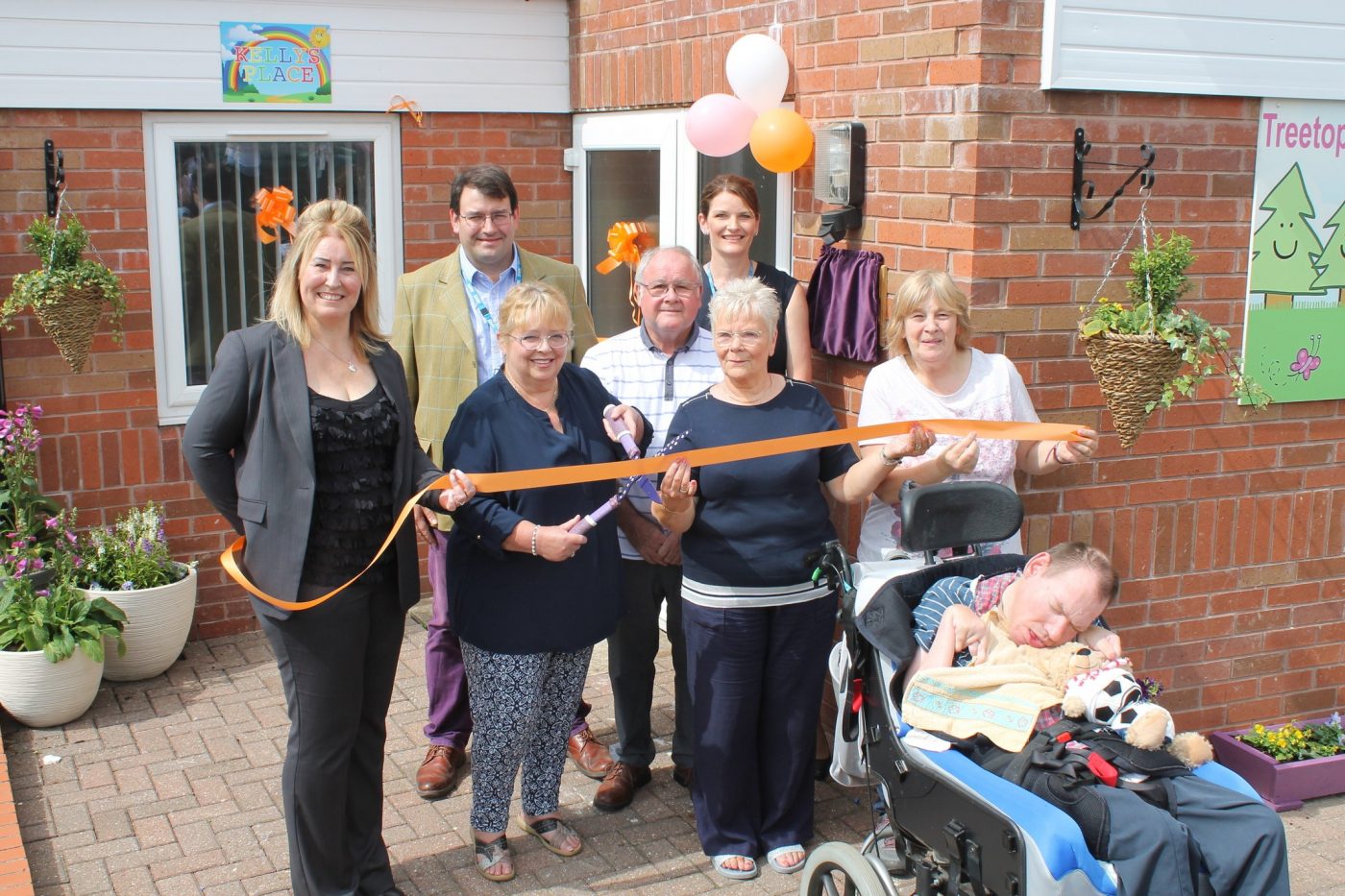Posts Tagged ‘ccg news’
Kelly’s Place respite facility opens its doors

Published on Aug 15, 2018
A new respite care facility for people with profound and complex learning disabilities has opened near Scarborough.
Kelly’s Place, founded by Ali Wilkins and run by Happy Futures Support Specialists Limited, is a bespoke two-bedroom bungalow in Burnside, Eastfield, featuring en-suite bathrooms, tracker hoists and ample moving space for wheelchairs.
It also has a large lounge, a fully equipped kitchen and a sensory room. The facility has been specifically designed to easily accommodate up to two individuals in a safe and comfortable environment.
Upgrading and development of the bungalow into the bespoke facility was part funded by NHS England (£20,000) and part funded by Happy Futures Support Specialists Limited (£38,000) while one of the two beds is funded in its entirety (£39,000 a year) by NHS Scarborough and Ryedale Clinical Commissioning Group (CCG).
The CCG’s Senior Service Improvement Manager, John Turner, said the CCG had been working with Happy Futures and families to get the facility off the ground since 2014.
“I’m delighted Kelly’s Place is now open,” he said. “It’s a brilliant facility that will offer exceptional support for an individual with multiple learning disabilities, while providing much-needed respite for their families and carers. They will be able to take some time off and have a break knowing their loved one is going to be well looked after in a facility that meets all their needs.”
Support at Kelly’s Place is offered by skilled support workers expertly trained to support those with profound disabilities and complex needs, 24 hours a day, seven days a week. Individuals can be supported at Kelly’s Place for up to 28 days.
Depending on the individual’s needs, Kelly’s Place offers one-to-one or two-to-one support with full day support and waking nights should it be required. Everyone receiving respite can also use the Happy Futures Skills Centre where they are able to expand existing skills, develop new ones and take part in a variety of activities.
Angela Fletcher, Managing Director at Happy Futures, a domiciliary support provider recently rated OUTSTANDING by the Care Quality Commission, said: “Concerned families made us aware of a shortage of quality respite care in 2014 and we knew something had to be done.
“What we now have is an incredible facility that will go a little way towards addressing the demand for short-term respite care. Throughout this process we’ve had some wonderful support from NHS England and NHS Scarborough and Ryedale CCG, but I particularly want to thank the families we’ve been working with for their dedication and passion.”
There are more images from the official opening event, here and you can view newsletters from Happy Futures, here.
[embed]https://videos.files.wordpress.com/rYKgYKCt/we-are-happy-futures-with-voice-over_std.mp4[/embed] Read MoreNorth Yorkshire Clinical Commissioning Groups to recommission local adult autism and ADHD services
Published on Aug 10, 2018
Local health groups in North Yorkshire and York are to recommission the services currently available to adults with autism and attention deficit hyperactivity disorder (ADHD).
NHS Scarborough and Ryedale Clinical Commissioning Group (CCG), NHS Vale of York CCG, NHS Harrogate and Rural District CCG and NHS Hambleton, Richmondshire and Whitby CCG want to redesign a service that better meets the needs of patients.
Led by NHS Vale of York CCG as lead commissioner, the CCGs are beginning to engage with local communities to gather insight which will be used to ensure there are improved pathways for diagnosis of autism and ADHD in adulthood.
Another aim of the engagement work is to increase awareness and understanding of autism and ADHD among frontline health professionals.
Scarborough Medical Group GP and NHS Scarborough and Ryedale CCG Associate Chairman, Dr Peter Billingsley, said: “We know the resources we currently have available don’t always meet the needs of adults with suspected autism or ADHD and it’s something that across York and North Yorkshire we’re eager to address.
“We want to take the opportunity to ask service users and carers how they feel about our current service and look at ways to improve the quality of the service for adult ADHD and autism diagnostics to ensure it meets the needs of the local population.
“For example, we’re aware that some people are waiting far too long for appointments and we want to improve that.”
As part of the wider North Yorkshire engagement work, there will be a public event in Harrogate Library on Tuesday 21 August from 10.30am to 12.30pm at which people can contribute to discussions about what a new autism and ADHD assessment service for adults could look like.
Locally, each of the North Yorkshire and York CCGs will be gathering feedback from people with ADHD and autism, their families and their carers.
A survey for Scarborough and Ryedale patients is also being circulated and can be found here: https://www.surveymonkey.co.uk/r/AautismADHD
You can find an easy read version of the survey here.
Below is the full interview with Dr Peter Billinglsy on Thats North Yorkshire Televsion:
Read MoreHealth and care partners back ‘Blood in Pee’ campaign
Published on Jul 26, 2018
Health and care partners in North Yorkshire are urging people to be aware of the early signs of bladder and kidney cancers and to go to their doctor if they see blood in their pee – even if it’s just the once.
‘Blood in pee’ is part of the national Be Clear on Cancer (BCOC) campaign from Public Health England in partnership with the Department of Health, NHS England and Cancer Research UK. Around 300 people in North Yorkshire are diagnosed with bladder or kidney cancer each year and approximately 120 people die.
NHS Scarborough and Ryedale CCG Governing Body Associate GP Member, Dr Jenni Lawrence, said: “As a GP in the Scarborough and Ryedale District, I’ve been involved in work to improve early diagnosis rates for bladder and kidney cancers. An important part of this is our blood in pee one stop clinic in Malton. Patients just have to see their GP to get a referral, and then go along to the clinic where they can receive all the tests needed in one place – and get an answer quickly.”
Bladder and kidney cancers can affect people of all ages, but the risk of these cancers increases as people get older and are most common in those over 50.
Blood in pee is a key symptom for both bladder and kidney cancer. Other bladder cancer symptoms include a urinary tract infection (cystitis) that is difficult to treat or comes back quickly after treatment and pain when peeing. Other kidney cancer symptoms include a pain in the side below the ribs that doesn’t go away, and weight loss.
County Councillor Caroline Dickinson, North Yorkshire’s Executive Member for Public Health, Prevention and Supported Housing, said: “The aim of Be Clear on Cancer campaigns is to increase public awareness of key cancer symptoms and to encourage people with those symptoms to see their GP early. This new campaign stresses how important it is if you notice blood in your pee, even if it’s ‘just the once’, to tell your doctor straight away.
“Blood in pee is a key symptom of both bladder and kidney cancers. The chances are it’s nothing serious, but these cancers are more treatable if they are found early.
“The campaign also asks people to look before they flush the toilet – and to go to see their GP if they notice blood in their pee. You’re not wasting anyone’s time by getting your symptoms checked out. And if you’ve been to the doctor but your symptoms haven’t gone away, go back – they’ll want to know and early diagnosis and treatment could save your life.”
Read MoreNHS Scarborough and Ryedale Clinical Commissioning Group backs NHS recruitment campaign
Published on Jul 16, 2018
NHS Scarborough and Ryedale Clinical Commissioning Group is backing a national campaign which aims to address staff shortages in the NHS.
The priority is to increase recruitment into the NHS, and improve the retention of existing staff.
Key areas currently facing the worst shortages including mental health, learning disability and community and general practice nursing, will be prioritised.
Our CCG Chairman, Dr Phil Garnett, said: “Remedying the staff shortages in GP surgeries and hospitals is one of the biggest challenges we face.
“As a CCG, we’re already doing lots to attract new doctors to work in our local practices and we’re expanding the range of healthcare professionals people can see.
“There are significant workforce challenges at Scarborough Hospital, so any measures that can be taken to address those are to be welcomed.”
The campaign launched on 3 July 2018 and has been designed to increase positive perceptions and pride in working within the NHS.
The campaign is running across TV and radio, and is also being promoted through digital and social media using the #wearetheNHS.
Read More‘Encouraging start’ for Humber Trust’s new model of community care in Scarborough and Ryedale
Published on Jun 14, 2018
The new adult community care service in Scarborough and Ryedale received almost 1,800 referrals in its first four weeks, new figures have revealed.
Humber Teaching NHS Foundation Trust (FT) said it handled 1,787 referrals made via its Customer Access Service (CAS), a single point of contact providing access to round-the-clock care, between 1 and 28 May.
The Trust also revealed that 1,849 individual patients received 9,147 face-to-face contacts during the same period, with the third week (2,477) proving the busiest.
Dr Peter Billingsley, Associate Chairman of NHS Scarborough and Ryedale Clinical Commissioning Group, which commissioned the new service, said: “I am delighted that Humber FT has got off to such a strong start in delivering adult community services for the people of Scarborough and Ryedale.
“The fact patients can access community and specialist nursing, therapeutic services and support from dietetics and stroke professionals with just one phone call is a huge benefit. It means we are able to offer patients streamlined and joined-up care to meet their needs. This vastly improves quality of life and wellbeing as well as being able to keep patients at home, where appropriate, avoiding disruptive and unnecessary hospital stays.”
Julia Harrison-Mizon, Humber FT’s Care Group Director for Primary Care, Community, Children’s and Learning Disability Services, said she was pleased with the data and paid tribute to the staff involved. “These figures show our new system is performing well,” she said, adding that “all of our staff deserve our thanks for their hard work.
“Although it’s still early days, we’ve made an encouraging start and now need to keep up the momentum to ensure we continue delivering the best possible service to our patients.”
The figures show the Trust’s CAS received 3,134 phone calls during the first four weeks of the contract, with the number peaking in the second week (884). Staff transferred 4,140 patients and have since registered a further 1,568 patients on the Trust’s electronic patient record system – SystmOne.
Patients can access services including community and specialist nursing, therapeutic services, dietetics, and stroke. They all receive personalised care designed to keep them in their own homes whenever it is possible and safe to do so.
The Trust’s front-line clinical teams are delivering the services by working with GPs, councils, the charity and voluntary sector and other key organisations.
Mrs Harrison-Mizon added: “Our partners have all played their part in helping us make a success of the launch. Working together more effectively is one of our key aims, and so far it’s going very well.”
The Trust will provide the services for up to seven years under the terms of an £80 million contract with its commissioners, NHS Scarborough and Ryedale Clinical Commissioning Group.
Read More
